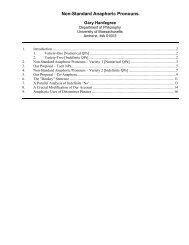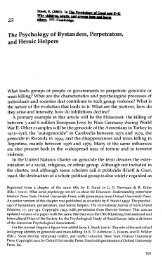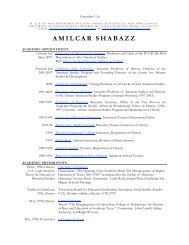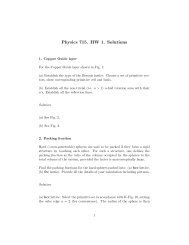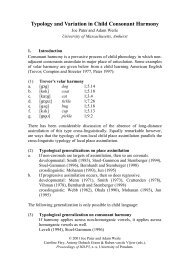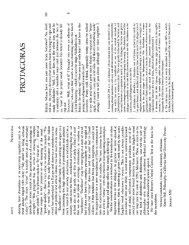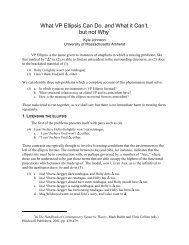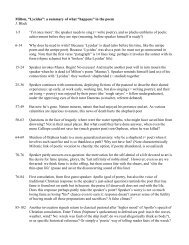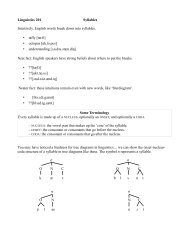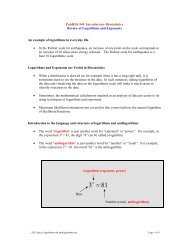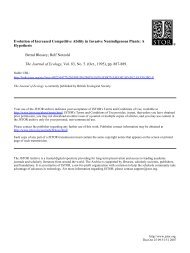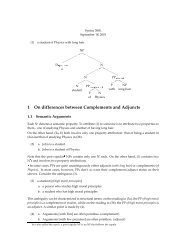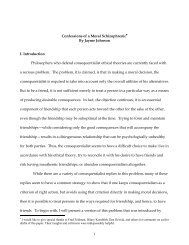Aristotle's Definitions of the Soul: "De Anima" ii, 1-3
Aristotle's Definitions of the Soul: "De Anima" ii, 1-3
Aristotle's Definitions of the Soul: "De Anima" ii, 1-3
Create successful ePaper yourself
Turn your PDF publications into a flip-book with our unique Google optimized e-Paper software.
Aristotle never applies this language to a fully adequate account. As shown above, an<br />
account 'rimr has <strong>the</strong> features <strong>of</strong> an account that is "clearer to us" in contrast with one<br />
which is "more intelligible in <strong>the</strong> order <strong>of</strong> explanation" and one which states <strong>the</strong> facts<br />
about some subject without giving <strong>the</strong> essence in contrast with one that gives <strong>the</strong> essence.<br />
Moreover, <strong>the</strong> only new general account <strong>of</strong> soul <strong>of</strong>fered after II, 1, at 413 b 11-13, is not<br />
derived by Aristotle, as it should be on this reading, from <strong>the</strong> account <strong>of</strong> II, 1 (nor can it<br />
be, since it covers <strong>the</strong> &pxij <strong>of</strong> <strong>the</strong> functioning separate intellect and <strong>the</strong> account <strong>of</strong> II, I -<br />
taken as a fully adequate account - does not). Again, it is <strong>the</strong> o<strong>the</strong>r way around (see<br />
Sections 5-8 below). Also, it would be quite uncharacteristic <strong>of</strong> Aristotle to start an<br />
inquiry with an account which is better known absolutely and <strong>the</strong>n take up an account<br />
which is better known to us. This goes against his preaching and his practice (see, e.g.,<br />
History <strong>of</strong>A nimals 491 a 7-14). The reading proposed here accommodates <strong>the</strong> description<br />
<strong>of</strong> <strong>the</strong> definition <strong>of</strong> II, I at 413 a 9-10 and fits <strong>the</strong> pattern <strong>of</strong> <strong>the</strong> discussion <strong>of</strong> II, 2. It is<br />
closest to <strong>the</strong> reading <strong>of</strong> G. Rodier (Aristote, Traite de l'Ame Paris, 1900, v. 2, 188-191),<br />
though it differs from his in various important respects.<br />
5 This remark is not normally taken as one <strong>of</strong> <strong>the</strong> definitions <strong>of</strong> <strong>the</strong> soul in <strong>De</strong> A nima II, 1.<br />
But <strong>the</strong> phrase "<strong>of</strong> that sort which has . . ." (TOLOV8 FxoVros . . ., b 16-17) specifies <strong>the</strong><br />
sort <strong>of</strong> body which ensouled things, as opposed to axes, have. It fills out what <strong>the</strong> "certain<br />
sort <strong>of</strong> body" (roovw& aqLsa) <strong>of</strong> b 11 is. And soul is xa%Xov <strong>the</strong> essence <strong>of</strong> that sort <strong>of</strong> body<br />
(b 10-11). See, fur<strong>the</strong>r, below on this.<br />
6 See <strong>De</strong> Caelo 292 a 20 ff., b 28 f., 290 a 29 ff., 285 a 29. The rendering <strong>of</strong> owpa 6pyavLx6v<br />
(412 b 5-6) as "a body with organs" is standard and 412 a 28 - b 4 strongly supports it.<br />
Ano<strong>the</strong>r possible rendering is "a body which serves as an instrument." (Cf. <strong>De</strong> Partibus<br />
Animalium 642 a 14, ff.) Such a body perhaps need not have organs, but only serve as an<br />
organ for, in <strong>the</strong> case in question, <strong>the</strong> performance <strong>of</strong> some vital function. So understood,<br />
an amoeba would, perhaps, have a aupa 6pyavLxo'v. But Aristotle does not believe that a<br />
living thing can perform active functions without organs which are heterogeneous parts<br />
(<strong>De</strong> Partibus A nimalium 646 b 11. ff.). So <strong>the</strong> amoeba still poses a problem. And <strong>the</strong> o<strong>the</strong>r<br />
problem remains. The stars do not use <strong>the</strong>ir bodies or any organ to move (<strong>De</strong> Caelo<br />
290 a 29, ff.).<br />
7 See 412 a 22-28 with 412 b 17-26 and 417 a 21, iff.<br />
8 These same problems would arise on any attempt to treat <strong>the</strong> fourth definition as<br />
referring to a special type <strong>of</strong> capacity for self-motion whose possession is necessary and<br />
sufficient for <strong>the</strong> presence <strong>of</strong> life and soul. Cf. n. 30, below.<br />
9 See also 408 b 18, ff., 411 b 15-19, 413 b 24-27, 430 a 17-23. This claim is found also in<br />
<strong>the</strong> biological works; see <strong>De</strong> Generatione A nimalium 736 b 27-29, 737 a 7-10.<br />
10 Metaphysics 1072 b 26-27 reaffirms that <strong>the</strong> activity <strong>of</strong> <strong>the</strong> intellect (vovs) is a form <strong>of</strong><br />
life (twi). And <strong>De</strong> A nima 29 a 28 speaks <strong>of</strong> <strong>the</strong> intellect as a type <strong>of</strong> soul (h VOq-TLX [iv 'Ix).<br />
At 413 a 8 it is soul (sAvxh) simply, in contrast (9,r a 8) to its parts (a 6-7), that is in<br />
question.<br />
12<br />
See G. Rodier, op. cit. for a concise report <strong>of</strong> <strong>the</strong> views <strong>of</strong> <strong>the</strong> older commentators.<br />
13<br />
See n. I above.<br />
14<br />
It is difficult to argue for an early date for <strong>De</strong> Anima III, 5 as Ross did (see n. 1), given<br />
<strong>the</strong> anticipations <strong>of</strong> its doctrines in Il 1, 2. Ross himself dropped <strong>the</strong> suggestion in his<br />
commentary (Aristotle, <strong>De</strong> Anima, Oxford, 1961, pp. 7-12).<br />
15 The commentators are not clear on this. Hicks, for example (op. cit., p. 322), identifies<br />
<strong>the</strong> definition which functions as conclusion with <strong>the</strong> type which displays <strong>the</strong> essence.<br />
16<br />
Some have tried to avoid this by introducing a fourth type <strong>of</strong> definition into Posterior<br />
275



